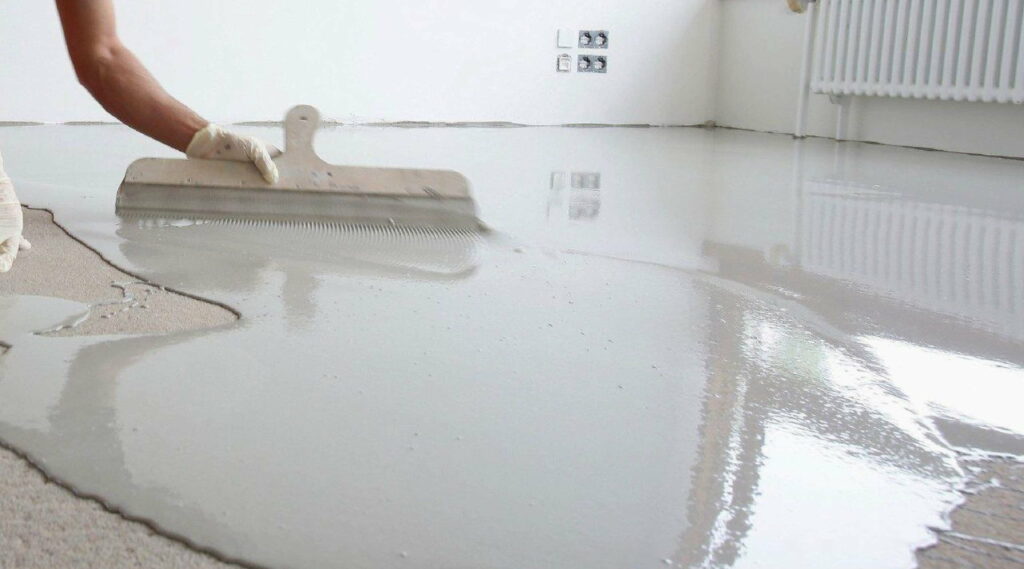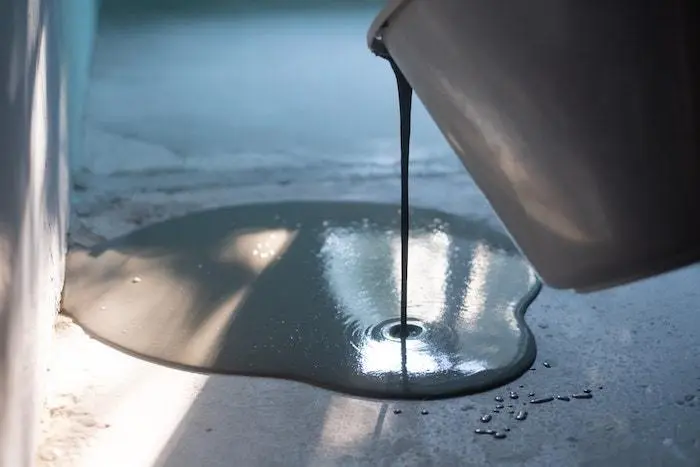We will explore the concept of self-leveling underlayment, and its role in leveling a subfloor, and provide expert tips for optimal results.
Note:
Some contents in this article may contain external links. For more information, please refer to our
Privacy Policy
What is Self-Leveling?

Self-leveling underlayment, alternatively referred to as a self-leveling compound or floor leveler, is employed to even out minor depressions and elevations in a subfloor before the installation of a final floor covering.
What is Self-Leveling Made Of?
There exist several variations on the market, yet they typically adhere to the same fundamental concept. Comprised of a blend of fine cement, polymers, and additional components, formulated to disperse evenly and establish its level, akin to a liquid. Moreover, specific chemical agents aid in the adhesion of the material to various subfloor surfaces such as wood, concrete, and more. With a notably smooth consistency, when prepared according to instructions, creates a slurry that can be effortlessly poured onto the subfloor.
What Kind of Finished Flooring Is It Used On?
Typically, the underlayment allows for the application of various types of finished flooring materials. Due to its thin consistency, it can be utilized beneath carpet, sheet flooring, vinyl, tile, laminates, and most other types of finished floors. Additionally, it can be applied beneath vapor barriers, carpet padding, and laminate foam underlayments.
What Are The Benefits Of Floor Leveling?
Concrete floors are a popular flooring option for both residential and commercial spaces due to their durability and low maintenance requirements. Despite these advantages, uneven surfaces can be a common issue with concrete floors. If you are experiencing this problem, read on to discover effective solutions for leveling concrete floors. Learn about the benefits of concrete floor leveling below.
Why Uneven Concrete Floors Happen?
Uneven concrete floors can be attributed to a variety of factors. Moisture is a common culprit, causing certain areas to swell while leaving others soggy, resulting in an uneven appearance. Additionally, concrete floors are susceptible to cracking, which, although less frequent, can also contribute to an uneven surface. Dips, cracks, chipping, and holes can further exacerbate the unevenness of the floor. This is where floor leveling becomes essential.
The Benefits Of Self-Leveling?
There are numerous advantages and benefits associated with the utilization of self-levelers. Here are several practical benefits to consider:
1. User-Friendly: One of the key reasons why self-levelers are effective is their ease of use. Most floor levelers are composed of a modified polymer-modified cement, making them simple to work with.
2. Smooth Surface Creation: Floor levelers can effortlessly create a smooth, flat, and even surface within a short period of time. They dry quickly and offer exceptional compressive strengths. This is why concrete surfaces are renowned for their durability, strength, and longevity.
3. Versatile Application: Floor levelers can be installed on a wide range of surfaces, including existing concrete, wooden, plywood, or ceramic floors. This versatility allows for greater flexibility in their usage.
4. Long-lasting and Cost-effective: By opting for an efficient self-leveler product, you can save money in the long run. This method proves to be cost-effective while also ensuring long-lasting results.
Bottom Line
Self-leveling products are an excellent choice for achieving a flawless surface and rectifying any flaws or blemishes. These self-levelers are user-friendly and provide an effective solution for addressing diverse floor-related concerns.
At AZ Floor Solutions, we provide top-quality self-levelers that will rejuvenate your floor, making it appear brand new. Our products are user-friendly and boast long-lasting durability. For further details, please don’t hesitate to contact us at 623-336-1707 or via email at co*****@**************ns.com.
Share This Article

